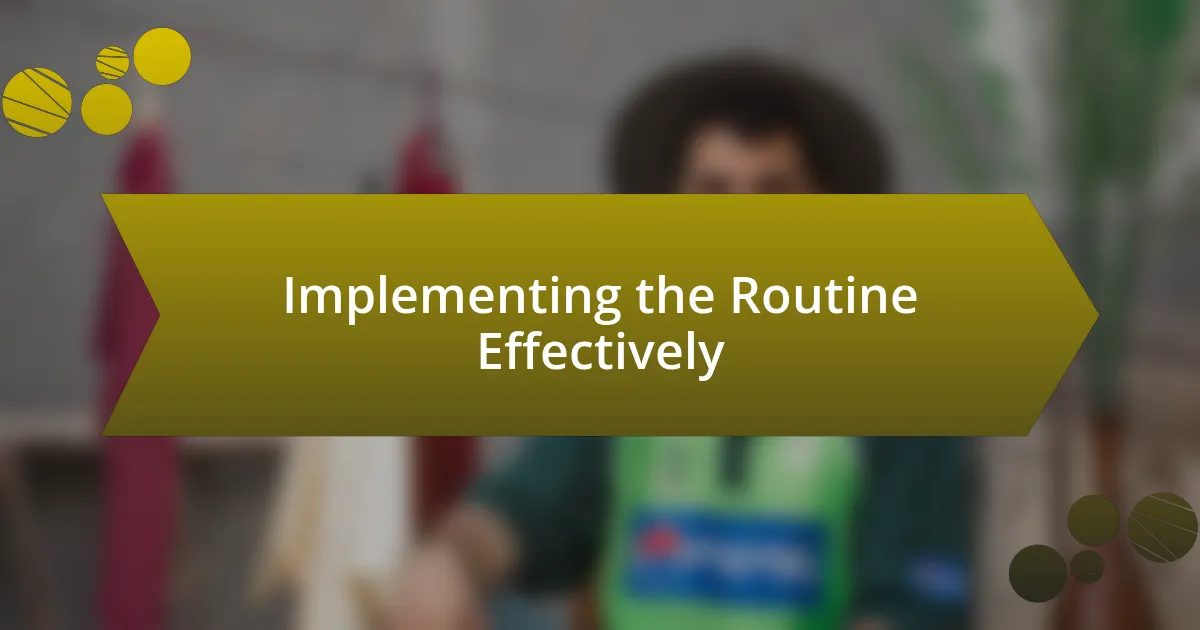Key takeaways:
- Routines create stability, enhance productivity, and cultivate healthy habits, significantly impacting well-being.
- Identifying personal goals and values helps structure meaningful routines that promote happiness and fulfillment.
- Regularly analyzing and adjusting routines is essential for adaptability and maintaining alignment with personal interests and commitments.
- Staying motivated can be supported by accountability partners and introducing variety, ensuring routines remain engaging and enjoyable.

Understanding the Importance of Routines
Routines play a pivotal role in creating a sense of stability in our lives. I remember the chaotic days when I had no structured schedule. It was overwhelming. Just like a ship without a compass, I often felt lost and anxious. Having a routine now grounds me, providing a much-needed anchor in the storm of daily pressures.
Consider this: how would your day change if you carved out specific moments for self-care or productivity? When I started prioritizing my morning routine, I noticed a remarkable shift in my focus and energy. The simple act of dedicating 15 minutes each morning to mindfulness made a profound difference, allowing me to approach my day with clarity and purpose.
Furthermore, routines not only enhance productivity; they help us cultivate healthy habits. I once struggled with my fitness goals until I transformed exercise into a non-negotiable part of my daily routine. This shift not only improved my physical well-being but also boosted my confidence. There’s something powerful about integrating consistent actions into our lives that ultimately fosters a greater sense of achievement and fulfillment.

Identifying Your Goals and Values
Identifying your goals and values is the cornerstone of developing meaningful routines. I’ve found that sitting down and reflecting on what truly matters to me has made a huge difference in how I approach my day. For instance, I once took a weekend to write down my long-term aspirations and immediate needs, which helped me clarify what I want to focus on in my daily life. This clarity acts like a guiding star, enabling me to structure my routines around my most valued pursuits.
When I think about values, it’s often a mix of what I hold dear and what energizes me. A few years back, I discovered that connecting with nature is essential for my happiness. As a result, I’ve woven daily walks into my routine, which not only refreshes my mind but also aligns perfectly with my value of maintaining a work-life balance. The joy I feel during these walks is a testament to how aligning routines with values enhances our overall happiness and satisfaction.
Goals can be both short and long-term, and identifying them helps in creating actionable steps within a routine. I remember setting a small goal of reading more, which initially felt daunting. However, I broke it down into just ten pages a day. Once I aligned this small goal with my value of personal growth, it became effortless to incorporate reading into my nightly routine. The accomplishment of completing books not only boosts my knowledge but fuels my motivation to set even bigger goals.
| Goals | Values |
|---|---|
| Short-term: Read 10 pages daily | Growth: Continuous learning |
| Long-term: Run a marathon | Health: Well-being and fitness |
| Short-term: Meditate for 5 minutes | Peace: Mental calmness |
| Long-term: Save for a home | Stability: Financial security |

Analyzing Your Current Habits
Analyzing your current habits is essential for understanding how they align with your goals and values. I once decided to keep a journal for a week, noting down everything I did on a daily basis. This exercise shed light on how much time I spent on unproductive activities, and it was eye-opening to realize where I could make adjustments. Acknowledging these habits is the first step toward making meaningful changes.
To really get a clear picture of your current habits, consider the following:
- Reflect on a typical day and identify activities that either energize or drain you.
- Track your screen time and social media usage to see if they align with your objectives.
- Recognize patterns where you often procrastinate and explore the underlying causes.
- Evaluate how your daily routines affect your mood and productivity levels.
- Notice how certain habits contribute to or detract from your overall well-being.
By diving into these aspects, I learned that cutting back on mindless social media scrolling freed up more time for activities I genuinely enjoyed—like cooking or reading, which brought me so much more fulfillment.

Designing Your Ideal Routine
When it comes to designing your ideal routine, I find it’s crucial to start with your core values. I once spent time outlining what truly mattered to me—health, creativity, and relationships—before crafting my daily schedule. This clarity helped me prioritize activities that aligned with these values, creating a routine that felt purposeful rather than just a list of tasks.
One of my favorite techniques is to envision my perfect day. I ask myself, “What would I want to feel at the end of the day?” After a bit of reflection, I realized that incorporating morning exercise and dedicated creative time brought me immense joy and clarity. By visualizing what I wanted, I could craft a routine that not only included these elements but also made space for spontaneity and downtime, which I learned were just as important.
Designing a routine should feel like building a structure that supports your life, not constrains it. I remember transitioning to a more flexible approach, allowing for adjustments based on my energy levels or unexpected events. It transformed my perspective; rather than dreading a rigid schedule, I began to look forward to each day with a sense of excitement and adaptability. Are you ready to experiment with your own routine? I encourage you to try new things and see what brings you the most joy and fulfillment!

Implementing the Routine Effectively
Implementing a routine effectively requires a level of commitment and flexibility. I remember the first week I tried to stick to a morning meditation practice; I felt overwhelmed. But by gradually shortening my meditation sessions and pairing them with other activities I enjoyed, like sipping my favorite tea, I found a balance that was manageable and enjoyable. How can you adjust your routine to make it feel less daunting?
One practical tip I’ve found invaluable is to set specific, achievable goals for each aspect of my routine. In my experience, it’s too easy to aim for perfection, but I learned that celebrating small wins—like completing a book chapter or cooking a healthy meal—makes me feel accomplished without the pressure. Have you considered what milestones you can celebrate in your own routines?
Finally, I recommend using reminders and cues to help reinforce your routine. I started placing sticky notes on my bathroom mirror with reminders of my goals—it felt personal and encouraging. When I see those notes, they serve as gentle nudges to stay on track, which creates a sense of accountability. Is there a way you can introduce prompts to keep your routine fresh in your mind?

Adjusting and Adapting Your Routine
Adjusting your routine is essential, especially when life throws unexpected changes your way. For instance, there was a time when I lost my regular workout schedule due to work commitments. Instead of giving up, I reassessed my situation and discovered I could fit in shorter, high-intensity workouts during lunch breaks. How often have you found yourself needing to pivot your schedule unexpectedly?
I firmly believe that adaptability is a skill we cultivate over time. There were weeks when I felt my nighttime reading habit wasn’t working because I was too tired. Rather than abandoning it, I switched to listening to audiobooks during my commute. This minor tweak not only kept my goal alive but also introduced a new method of enjoying stories. Have you thought about different formats or times for your routines that might resonate better with your lifestyle?
Finally, it’s crucial to check in with yourself regularly. I set aside a few minutes every Sunday to reflect on what felt good in my routine and what didn’t. This practice has led me to discover that some activities, while initially appealing, no longer served my goals. By making room for ongoing adjustments, I keep my routines aligned with my current interests and commitments. What changes could you envision to ensure your routines remain relevant and invigorating?

Staying Motivated and Committed
Staying motivated when establishing meaningful routines can be a challenge, especially during those inevitable moments of doubt. I remember when I started journaling daily; some days, the blank page felt daunting. To combat that, I broke my goal into smaller steps, like writing just a few sentences instead of worrying about filling an entire page. Have you ever felt overwhelmed by your goals and needed to simplify them?
Commitment often requires consistency, but I’ve learned that accountability partners can make a significant difference. When I partnered with a friend to maintain our exercise goals, sharing our progress kept both of us engaged and accountable. It was inspiring to celebrate each other’s small victories! How have social connections played a role in your commitment to routines?
Sometimes, I notice that my motivation wanes when the initial excitement fades. To reignite that spark, I embrace variety within my routines. For instance, I might choose different parks for my morning runs or switch up my smoothie recipes. This little change helps me reconnect with the joy of my activities. What strategies have you found helpful in keeping your routine fresh and enjoyable?













